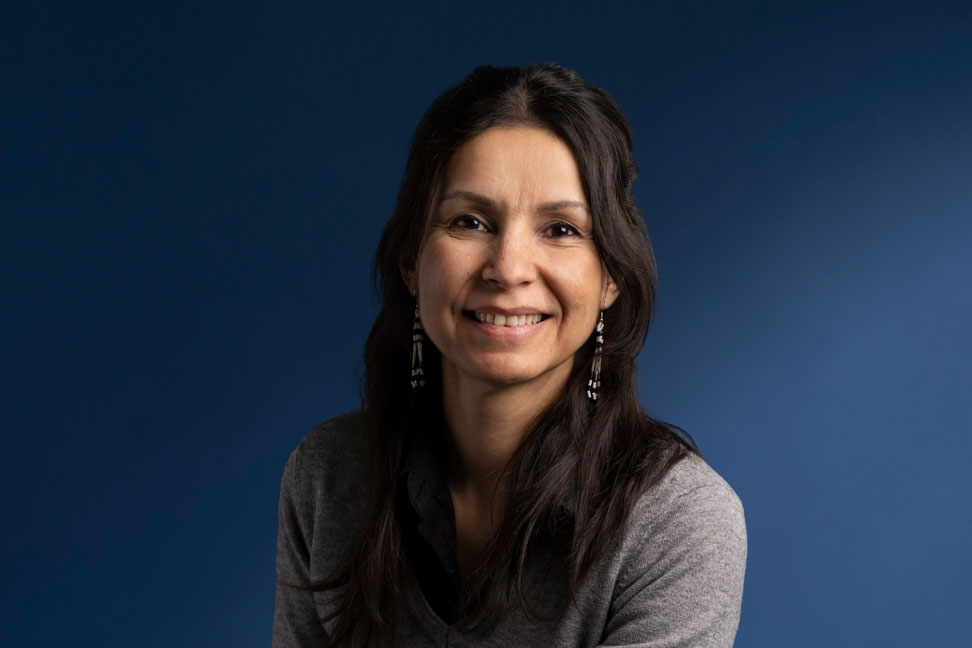- Overview
The INRS-UQAT Joint Research Unit professor shares her vision for reconciliation in education

Professor Nancy Wiscutie-Crépeau
Professor Nancy Wiscutie-Crépeau is an Indigenous education specialist with expertise in language teaching in Indigenous contexts. She focuses particularly on the place Indigenous languages in the educational sphere. She works from the standpoint of decolonizing research.
In this capacity, and as a member of the INRS-UQAT Joint Research Unit in Indigenous Studies, Professor Wiscutie-Crépeau was invited to be a guest editor for the special issue of the Journal of the Canadian Association for Curriculum Studies (JCACS), 2023 edition. She co-authored the article “The Scope of the Truth and Reconciliation Commission in Canadian Francophone Contexts” with her colleagues Nicholas Ng-A-Fook from the University of Ottawa, Jo Anni Joncas from the Université de Sherbrooke, and Laurie Pageau from the Université du Québec à Chicoutimi.
The article was a collective examination of the scope of the Truth and Reconciliation Commission’s Calls to Action in Francophone educational settings, which the Anicinabekwe researcher from Abitibi collaborated on.
Here, Nancy Wiscutie-Crépeau shares her experience writing this text and her broader vision of reconciliation.
What did you contribute to the journal? What is the broader context of the issue?
This special issue looks at indigenization, reconciliation, decolonization, and identities in education, as well as education policy and curriculum. The aim of our collaboration was to take a look at the work being done in Canadian Francophone settings in order to better understand the particular position these communities have in the Canadian project of settler colonialism.
The contributions to the article present emerging research carried out on several traditional Indigenous territories in Quebec, as well as theoretical reflections from researchers in Quebec, Alberta, and Saskatchewan.
Specifically, the idea behind our collaboration was to observe what is being done in terms of reconciliation with Indigenous Peoples in Francophone settings, because realistically, very little is known on the subject.
When the issue of reconciliation is addressed in Canadian educational literature, it is often in an Anglophone context. However, there is a number of relevant work in Francophone settings, both in Quebec and in the rest of Canada, that is worth a look because of the specific issues addressed.
As Professor Dwayne Donald points out in an interview for this publication, Francophone communities in Quebec — that have now existed for generations— h ave struggled with identity issues that are deeply rooted in the place we now call Quebec, complicating relations between Quebecers and Indigenous Peoples.
That’s why we need to consider, both individually and collectively, how to work together towards reconciliation and how Quebec as a society can make relations with Indigenous Peoples more balanced and respectful of their most fundamental rights.

In fact, the Truth and Reconciliation Commission sets out a principle that calls for sustained public education about the impacts of residential schools, the rights of Indigenous Peoples, and their historical and contemporary contributions to society. I think teachers have a very important role to play in the reconciliation process. They have their own commitments to make.
In research and in training, we should develop the habit of considering our positionality — where each of us is situated in the current socio-historical context. We need to take our colonial heritage into account if we want to change the way we relate to each other and understand the complex issues surrounding truth and reconciliation. Making space for Indigenous knowledge in our research and education is not something that can be done any which way.
What did you take from your experience as a guest editor? What were your thoughts as a researcher and as an Indigenous person?
It was actually my first experience as a guest editor, and I was very pleased. When I was approached to collaborate on the publication, I wondered what I could contribute, since I don’t work on reconciliation specifically.
However, as an Indigenous person trained in education and the child of a mother who was in a residential school for ten-odd years, I feel concerned by what is happening in education today in terms of truth and reconciliation. Contributing to the journal was an opportunity to learn more about the issue.
I also saw the project as a way to build relationships with colleagues who are interested in these issues and, most importantly, to contribute to a better understanding of what is happening in Francophone settings in terms of reconciliation. The process still has a long way to go, and knowing the truth is an essential prerequisite for reconciliation.
Your research focuses on the place of Indigenous languages in schools, among other things. How does the theme of this special issue on reconciliation in Canadian Francophone settings echo your work?
In the research field, there is a great deal of work that needs to be done with Indigenous communities to change our practices — specifically, to decolonize our ways of doing things. As researchers, we are called upon to adapt to communities and to listen to the concerns of Indigenous Peoples, which means that our projects must start from the ground up and have real benefits for the communities we collaborate with. Our work should also promote dialogue between scientific and Indigenous knowledge and respect their ways of knowing and being.
In my view, reconciliation also involves restorative actions. For example, doing work that supports the reappropriation of an Indigenous language in a school setting is a way to contribute of repairing what has been broken. Nothing about this work is perfect, but I believe that this type of action can help further some of the aspirations of Indigenous Peoples, including access to a good education for future generations.
In short, I believe that reconciliation isn’t just about taking action through our work. It goes much further than that. We also need to practice reconciliation in each of our lives and make sure that it means something.
